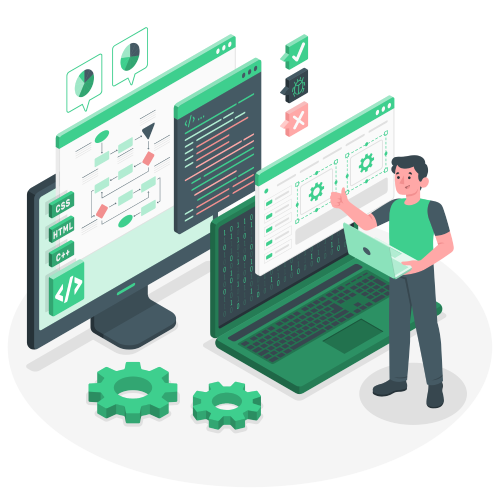ERP
ERP for Manufacturing Industry
Summary
What is an ERP for the manufacturing industry?
An ERP for the manufacturing industry is an integrated management system designed specifically to meet the needs of manufacturing businesses. It is software that allows the centralized management of all operational and administrative processes within a company.
An ERP for the manufacturing industry helps automate and streamline various business activities, such as production planning, stock management, purchasing, orders, supply chain, human resources, and other key processes.

What are the specificities and challenges of the manufacturing industry?
Here are some specificities and challenges
Production
One of the main challenges is production management. Companies need to plan and track various stages of the manufacturing process, manage cash flow (raw materials, equipment, labor), and optimize the use of production capacities. Therefore, an ERP must offer advanced features for production planning, order tracking, workshop management, etc.
Stock Management
Manufacturing companies often have significant inventory levels with a wide variety of parts and components. The ERP must efficiently manage stocks by optimizing levels, avoiding shortages or overstocks, forecasting supply needs, and facilitating inventory movement tracking.
Supply Chain Tracking
In the industry, coordination with suppliers and subcontractors is essential. The ERP system must manage relationships with suppliers, automate procurement processes, track delivery times, manage customer contracts and purchase conditions, and ensure visibility across the entire supply chain.
Quality management
Product quality is a major concern. The software must include quality management features, such as quality control, product traceability, handling non-conformities, and implementing continuous improvement processes.
Costs
Companies must effectively manage production costs to remain competitive. The integrated management software must accurately track expenses, calculate costs, analyze variances, and make decisions based on reliable financial data.
System integration
There are different systems and software used for specific tasks. The ERP must be able to integrate with these existing tools (such as CAD/CAM software, production machines, control systems) to centralize data and ensure optimal synchronization and consistency.
How have ERPs changed the manufacturing industry?
ERPs have brought several significant changes to the manufacturing industry. Here are some of the major impacts on this sector:

Improved operational efficiency
They have automated many manual processes in the industry, such as production planning, inventory management, order management, and more.

Optimized resource management
They provide real-time visibility into the company's activities, such as raw materials, equipment, and labor.

Enhanced supply chain coordination
They facilitate coordination among different stakeholders in the supply chain, such as suppliers, subcontractors, and distributors.

Increased traceability and quality management
They have strengthened product traceability throughout the value chain.

Data-driven decision-making
They provide accurate, up-to-date, and consolidated data on various business activities.

System integration and process standardization
ERP software has facilitated system integration and process standardization within manufacturing companies.
Why use ERP software for the manufacturing industry? Here are 5 advantages:
1
Centralization of data
ERP software centralizes all company data, facilitating access and information sharing between different departments. This eliminates information silos, promoting collaboration and informed decision-making.
2
Automation of processes
It automates many manual and repetitive tasks, reducing errors, delays, and expenses. Processes are simplified and accelerated through automation.
3
Improvement of efficiency and productivity
Process automation and data centralization allow for better operational efficiency. Employees can quickly access relevant information, optimize resource utilization, reduce downtime, and delays, leading to an overall increase in company productivity.
4
Resource management optimization
ERP enables optimized management of financial activities such as raw materials, equipment, and workforce. Advanced planning and tracking tools enable more efficient use of production capabilities, reducing expenses and improving profitability.
5
Data-driven decision-making
The tool provides accurate and up-to-date data on organizational performance, including expenses, delays, stock levels, etc. Generated reports and dashboards offer an overall view of the company, identifying trends for clients, opportunities, and potential issues.
Why choose Axelor for implementing manufacturing ERP?
Axelor is an Open Source ERP solution that offers specific functionalities for the manufacturing industry. Here are some reasons you might choose this ERP:
Tailored to manufacturing
Axelor provides modules and features specifically designed to meet the transformation needs of the manufacturing industry, such as production planning, order management, inventory, resource, cost management, and product traceability. You can customize the solution based on the specificities of your organization and manufacturing processes.
Open Source solution
Axelor is an Open Source ERP software, granting you access to the source code for modification and adaptation according to your needs. This provides additional flexibility and scalability, allowing you to adjust the ERP solution as your business evolves.
Integration and Interoperability
Axelor offers modules and features tailored to the transformation needs of the manufacturing industry, such as production planning, order management, inventory, resource, cost management, and product traceability. You can customize the solution based on your organization's specifics and manufacturing processes.
User-friendly and intuitive interface
Our system offers a user-friendly and intuitive interface, facilitating user adoption. Features are presented in a clear and ergonomic manner, reducing the learning curve and enabling employees to fully leverage the solution from the start.
Customization and Scalability
The platform allows customization of processes, forms, and reports according to your specific needs. You can configure the ERP based on your organizational structure, workflows, and preferences. Additionally, our tool is modular, accommodating your company's growth and adapting to changing needs over time.
Discover how our ERP can help improve your business performance
An expert will contact you soon to discuss your project.